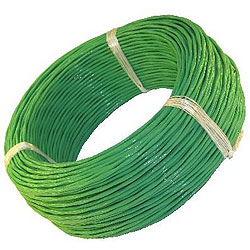Extension Cables
 Extension cables insulated with glass fibres
Extension cables insulated with glass fibres
Glass fibre-insulated cables are suited for high temperatures in a dry environment. They can be laid firmly or flexibly. If the temperature exceeds 180 °C, cables should be laid firmly as a rule and flexibly as an exception. In the case of flexible laying tensile stress must be avoided. Glass silk-insulated cables are not suited for permanent bending and kinks must be avoided during installation.
Description | TC - Type | Item Number |
GG-220-2J-0,2M | Fe-CuNi | 2-2202-00009 |
GG-220-2J-0,5M | Fe-CuNi | 2-2202-00003 |
GG-220-2K-0,5M | NiCr-Ni | 2-2200-00007 |
GG-220-2K-1,0M | NiCr-Ni | 2-2200-00010 |
GG-220-2L-0,2M | Fe-CuNi | 2-2201-00004 |
GG-220-2L-0,5M | Fe-CuNi | 2-2201-00006 |
GG-220-2L-1,0M | Fe-CuNi | 2-2201-00007 |
Temperature range: | laid firmly -25...+400 °C
laid flexibly -25...+180 °C
|
Burning properties: | flameproof, no corrosive gases |
It is recommended to obey the following minimum bending radii (temperature < 180 °C): | |
Flexible laying: | 10 x outside diameter |
Firm laying: | 4 x outside diameter |
INQUIRE ABOUT THIS PRODUCT

